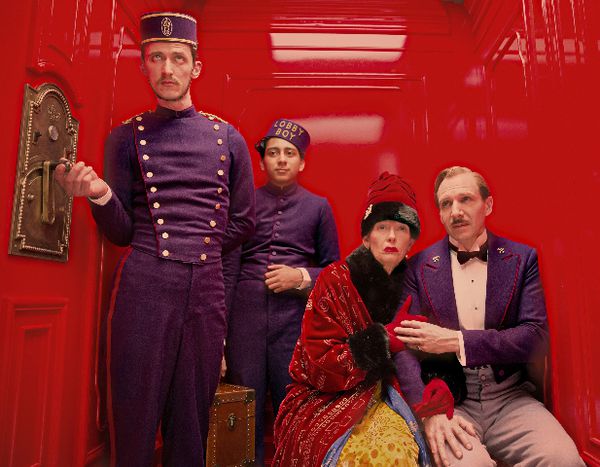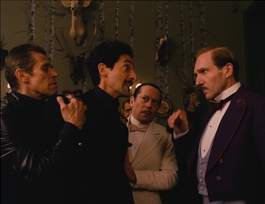
Slapstick in the Grandhotel: The Silver bear 2014
Published on
Translation by:
 Danny S.
Danny S.
An overly perfumed concierge, a lobby boy with a painted-on mustache and the myserious death of an old, irritable countess translate into success. The Silver Bear of the 64th Berlin International Film Festival goes to Wes Anderson's The Grand Budapest Hotel. Rightfully so? Film review.
Within a tiny, bright red elevator are one of the concierges and a young applicant for the position of lobby boy. "Why do you want to be a lobby boy?" asks concierge Monsieur Gustave H (Ralph Fiennes) of the young Zero Moustafa (Toni Revolori). "Who wouldn't?" is his response. With that, a strong friendship and the opening of Wes Anderson's turbulent story kick-off. The Grand Budapest Hotel, which is the name of the film, was the opener for the Berlinale.
The setting is a gorgeous hotel in the spa resort Nebelsbad, a town in the fictional eastern european republic of Zubrowka. Since the beginning of the 1930s, concierge Monsier Gustave has been cultivating deep relationships with his guests. Love affairs with older women is seen by him to be perfectly normal. One of them is the 84 year old Madame Céline Villeneuve Desgoffe and Taxis (Tilda Swinton). Madame D for short. The irritable countress bequeathes a valuable Renaissance painting to him. Her family, however, isn't fond of the idea. Without hesitation the concierge and lobby boy make a getaway with the painting safely stored in their luggage. What follows are a series of pursuits to secure the fortune of the deceased countess. At the same time, attempts are made to solve the mysterious death of Madame D.
Official Trailer of The Grand Budapest Hotel from director Wes Anderson (2013)
The Grand Budapest Hotel is a fulminant crime-comedy with bitter-sweet undertones. It's a film about loyalty and friendship in the foreground of a Europe that's dramatically changing. The film shows the transition from a golden age to a fascist takeover. We even see the ascenscion of the communist regime. For his film, Wes Anderson created his own universe. Inspired by the stories of the austrian writer Stefan Zweig, Anderson ripped off the entire history of 20th century Europe. This is underscored through a constantly changing visual aesthetic. In the beginning, the Grand Budapest, which can only be reached by cog-and-pinion railway, is grandiose and luxurious with ornaments and marvelous details. In the end it's only a functional hotel without any luxuries. Moreover, the castle of Madame D's family carries the markings of a fascist takeover. Everything inside is dark and comes across as ruthless.
Every day a newly painted mustache
 The looming catastrophe is also reflected in the characters. Anderson developed wonderfully lavish and exaggerated characters, such as Madame D's son Dimitri (Adam Brody). His hair, clothes, thoughts, outlook and everything else about him is dark. Monsieur Gustave by contrast is very elegant, always aware of his looks and wears a little too much perfume. But above all, he's loyal. Loyal toward the hotel, his guests and his friends. The same goes for Monsieur Gustave's protégé Zero Moustafa, who is just as aware of his looks, which is why he paints himself a mustache every day.
The looming catastrophe is also reflected in the characters. Anderson developed wonderfully lavish and exaggerated characters, such as Madame D's son Dimitri (Adam Brody). His hair, clothes, thoughts, outlook and everything else about him is dark. Monsieur Gustave by contrast is very elegant, always aware of his looks and wears a little too much perfume. But above all, he's loyal. Loyal toward the hotel, his guests and his friends. The same goes for Monsieur Gustave's protégé Zero Moustafa, who is just as aware of his looks, which is why he paints himself a mustache every day.
The characters actions are just as crazy as they themselves are. Things constantly become turbulent, and through choreographed, slapstick moments, the viewer is reminded of the era of silent films. One such comical scene is the rescue operation carried out by the "Society of the Crossed Keys." Monsieur Gustave rushes to the aid of the Secret Society, a complex brotherhood made up of the best concierges (Bill Murray, among others). A montage ensues of one concierge informing his lobby boy, who then calls another concierge to inform his lobby boy.
The Grand Budapest Hotel is dazzling, wry and vexing, just like Wes Anderson's earlier films like The Royal Tennenbaums (2001) or Darjeeling Limited (2007). Wes Anderson succeeds in creating a critical comedy of a dark time in Europe's history.
CAFÉBABEL BERLIN BEI DER 64. BERLINALE
 We love films! You can get our daily updates directly through our magazine or through Berlin.Babel.Blog and @CafebabelBerlin. Look forward to gripping film reviews, interviews with undiscovered stars and lots of photos from around the Berlinale Palace.
We love films! You can get our daily updates directly through our magazine or through Berlin.Babel.Blog and @CafebabelBerlin. Look forward to gripping film reviews, interviews with undiscovered stars and lots of photos from around the Berlinale Palace.
Translated from Slapstick im Grandhotel: Der silberne Bär 2014


